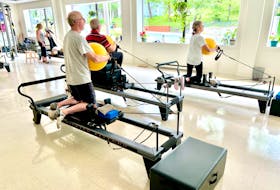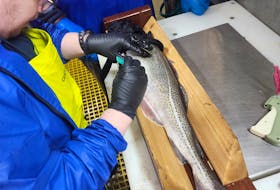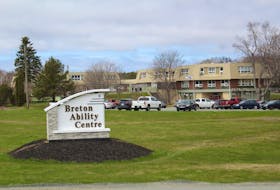SYDNEY – John Finnegan was anticipating a banner year for his business this summer.
Earlier this year, the owner of the Bras d’Or Lakes Campground received a record number of reservations for the 2020 season, in the wake of the facility's 20th anniversary.
Despite the promise of a season to remember, things quickly changed in mid-March when the COVID-19 pandemic took the world by storm, causing the closure of provincial and state borders along with several restrictions aimed at stopping the spread of the virus.
“I would say this year will probably be the slowest year we’ve had,” said Finnegan. “I don’t see anything happening from the news in both countries – people are staying closer to home.
“We have friends in the business in Canada and the United States and we’ve been in touch with them and everyone has the same take on this season.”
In January and February alone, the Baddeck business had more than 1,500 bookings for the summer months and more were expected. Since mid-March, Finnegan said the majority of those reservations have been cancelled, but there is an upside.
“Over 90 per cent of people who called to cancel because of the virus have told us to keep the money because they’re coming next year for sure,” he said. “We usually have a lot of groups who come in with two to four groups traveling together, so the numbers add up quickly.”
With peak vacation time only weeks away, many travellers are considering “staycations” in an attempt to enjoy the summer months, while also supporting local businesses like campgrounds, cottages, restaurants, motels and hotels.

With the uncertainty of the tourism industry, Destination Cape Breton CEO Terry Smith believes supporting local businesses and operators is more important than ever.
“We definitely need to rely upon everyone that we can, especially locals, to get out and explore their backyard because our tourism industry desperately needs it,” said Smith. “We don’t know if the borders are going to open beyond the province right now.”
Destination Cape Breton is working to develop a strategy in hopes of salvaging as much of the tourism season as possible. The campaign is expected to fully launch on Monday.
“Our campaign will initially focus on people within Nova Scotia, including Cape Breton residents,” said Smith, noting Nova Scotians spend about $800 million annually on travel out of province. “Hopefully at some point in the season we’ll be able to open to Atlantic Canada, but beyond that, we’re not banking on anything, so we’ll see what we can do in terms of getting people from within the province and region.”
Part of the strategy will be focused on social media, Smith said.
“We have some great relations and influencers on social media, both around the island and within the province as well, so we’ll be working closely with them and rolling out some innovated campaigns,” he said.
“Hopefully when people are out there and enjoying some of the experiences that they’ll have, they will snap photos and video and share that (on social media) and it creates more interest in discovering our own backyard.”
Destination Cape Breton has received mixed reactions from tourism operators on the island, depending on the type of business.
Waiting on Atlantic bubble announcement

“We talked with one operator recently who is almost fully booked for the season,” said Smith. “On the other side of things, there are operators who don’t have very many bookings at all at this point, so hopefully we can change that.”
As the number of confirmed COVID-19 cases continue to drop in the Atlantic provinces, Prince Edward Island Premier Dennis King hinted Atlantic Canadians may be able to travel within the four provinces as soon as early July.
There has been discussion of the possibility of having an Atlantic bubble, meaning travel would be allowed for residents of Nova Scotia, New Brunswick, P.E.I. and Newfoundland and Labrador. However, no official announcement has been made.
In Newfoundland and Labrador, the province’s tourism industry was experiencing a boom prior to COVID-19. Visitors typically spend over $1-billion in the province, according to the provincial government, with 2,700 different businesses operating and 20,000 jobs created.
David Li, owner of Knotty Pine Cottages in Ingonish Beach, is hopeful the idea of staycations will be of interest to local residents.
“After two months of quarantining, I’m sure there are many locals who will want to get out of the house and get away for some fresh air,” said Li. “Local businesses need as much help as possible, especially this year, and staycations are one way of doing your part.”
Prior to the outbreak, Li, like many businesses, was expecting extra traffic with tourists from across the country visiting the Cape Breton area.
“We were really hoping for another busy season,” said Li, who purchased the business three years ago. “Unfortunately, we’re going to lose lots of money this year, but hopefully we can make some of it up.”
Although he hasn’t lost all bookings for the summer, Li said his business is down about 70 per cent compared to last year.
“Last year, we were 85 per cent booked for the month of July alone, but right now we only have 20 per cent booked for both July and August,” he said. “The majority of business has been from tourists coming to the island, but it’s been pretty much lost as of right now.”
Camping, community gardens and garden centres, driving ranges, golf courses, hiking and ATV trails, paddling, surfing, kayaking, sailing and boating as well as sportfishing are among some of the activities allowed in Nova Scotia.
Provincial and municipal beaches and parks are also open. Many restaurants have also opened their doors for dine-in service but have limited capacity in an attempt to keep customers and staff safe.
Some local businesses are offering specials when it comes to those choosing to have staycations close to home. Finnegan is offering a 10 per cent discount as appreciation for Nova Scotians, while Li has a 15 per cent discount for those traveling from within the province.
Along with supporting his business, Finnegan hopes locals will continue to support other businesses, including those in the Baddeck area and across the island.
“This affects everyone, not just us as a business,” said Finnegan. “I don’t know how many local people will come – this virus is scary – but hopefully we can all come out of this together.”








